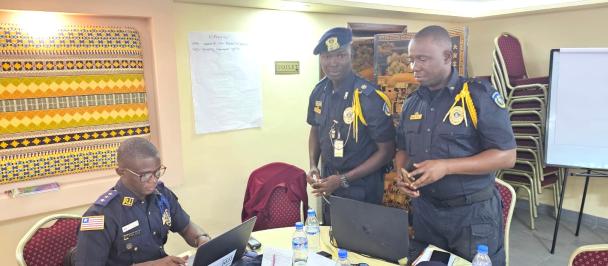Sergeant Patience Dorsla, Deputy Chief Officer responsible for combatting domestic violence in the Women and Children Protection Section of the Liberia National Police (LNP).
I was fortunate to have been among 29 female officers selected from the Liberia Police in Montserrado County, home to the country’s capital city – Monrovia, to attend a gender equity training that changed my career path in more ways than I would ever have imagined.
In September 2019, I was informed via a Human Resource Bulletin of the Liberia National Police that I had been listed to attend a two-day Gender Equity Training in Grand Bassa County ( west of Montserrado County).
As a police officer at the national headquarters, I have, over time, experienced great levels of discrimination from senior male officers. The institution has a high gender disparity emanating from the traditional perception that policing is combative, and therefore better-suited for men. Most promotions and other strategic assignments are, as such, assigned to men. Today, even as the dynamics of policing are changing around the world, our senior supervisors are, to some extent, still treating women officers stereotypically.
The Gender Equity training was provided by the Emancipation Movement of Liberia, Inc. (EMOL), with support from UNDP. It was unlike any other police trainings I had ever attended in more ways than one. It was a beautiful experience. In my career as an officer, it was the first time I attended a gathering about policing in Liberia with more women than man; out of 50 participants, 21 were men and 29 women.
In this training, both senior and junior officers met and sat side by side to acquire knowledge and address some of the gender disparities in the institution. To the best of my knowledge, this training was a first of its kind, breaking hierarchical protocol bringing together both junior and senior officers to interact and discuss the various topics taught.
I am grateful for the manner in which this blending of attendees was done. Sitting and learning side-by-side my senior officers, who have the authority to promote and assign junior police officers, I was empowered by the knowledge acquired as well as the setting in which it was acquired. My senior supervisor was a participant too. He committed to refrain from all sorts of discrimination based on gender, and to be gender- sensitive in making decisions.
When I returned to work after the training, the knowlege I gained was extremely useful to my work. I have become a more professional person, as I interact with vulnerable women and children who need me, as well as my superiors who rely on my expertise to deliver. As a result, I was promoted, alongside other women colleagues who took part in the training. I was promoted from the third in command to the second in command in the Women and Children Protection Section of the Liberia National Police, with added leadership responsibilities. I am now the first “go-to-person” on matters relating to domestic violence before they can be escalated to the head of section.
The training served as an eye opener and has increased my knowledge and confidence such that today I can boldly and courageously stand up to take any task that my male counterparts are assigned.

 Locations
Locations





